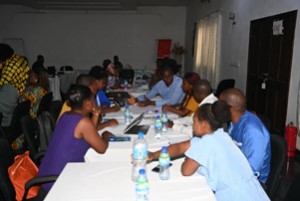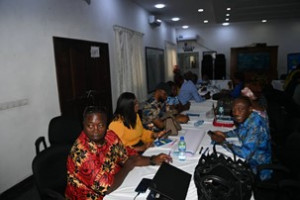By Foday Moriba Conteh
In order to enhance nutrition coordination and scale-up actions by providing a comprehensive overview of nutrition stakeholders, their geographical coverage, and the beneficiaries of core nutrition actions in the country, the UN Nutrition Network comprising of FAO, UNICEF, WHO and WEF, in collaboration with the Scaling Up Nutrition Movement has on Thursday 18th April 2024 concluded a one-day validation workshop on the 2022 Stakeholders and Nutrition Action Mapping Results. The event was held at the Family Kingdom Resort on Aberdeen in Freetown.
Addressing the gathering on behalf of the UN Family, Hannah Yankson, the National Professional Officer for Nutrition and Food Safety and Acting Team Lead Healthier Population Cluster at the World Health Organization (WHO), said that the objective of the exercise is to enhance nutrition coordination and scale-up actions by providing a comprehensive overview of nutrition stakeholders, their geographical coverage and the beneficiaries of core nutrition actions.
Enumerating the anticipated outcomes, Yankson outlined six key areas where the findings from the mapping exercise are expected to make a significant impact. These include guiding nutrition planning, budgeting, and prioritization at national and sub-national levels, informing advocacy efforts to attract increased investment in nutrition, and enhancing stakeholder involvement across sectors to support positive nutrition outcomes.
Furthermore, she emphasized the importance of tracking and coordinating the implementation status of the national nutrition plan, strengthening nutrition information systems, and documenting the landscape of key nutrition actors and actions across multiple sectors.
Concluding her address, Hannah Yankson reiterated the UN family’s commitment to supporting the Government in strengthening advocacy, coordination and nutrition governance. She emphasized the goal of bringing together key Government sectors and stakeholders to accelerate evidence-based actions aimed at improving nutrition outcomes in the country.
She expressed hopes for a successful validation process and highlighted the exercise’s contribution to achieving Sustainable Development Goal 2 (Zero Hunger) and SDG 3 (Improving the Health and Well-being of the Population) by 2030.
On her part, Aminata Shamit Koroma, the Chief Nutritionist/Director of Nutrition at the Ministry of Health, commended the UN Nutrition Network and the Scaling Up Nutrition Movement for their initiative in conducting the 2022 Stakeholders and Nutrition Action Mapping. She emphasized the significance and timeliness of those results.
Aminata Koroma highlighted the importance of the mapping exercise, noting that there are nutrition stakeholders whose work the Directorate on Nutrition is unaware of, which has negatively impacted their outcomes, activities and resource allocation.
She expressed optimism that the validation of the 2022 Stakeholders and Nutrition Action Mapping Results will improve nutrition coordination and scale-up actions. This, she believes, will offer a comprehensive overview of nutrition stakeholders, their geographical coverage, and the beneficiaries of core nutrition actions in the country.
Representing the Minister of State Office of the Vice President, Nenebah Jalloh, the National Coordinator of the Scaling Up Nutrition Office of the Vice President, highlighted Sierra Leone’s steadfast commitment to combat malnutrition.
She emphasized Sierra Leone’s unwavering dedication to combat malnutrition, deeply ingrained in the nation’s agenda. Since 2012, Sierra Leone has actively participated in the Scaling Up Nutrition (SUN) Movement, a global initiative addressing under nutrition and promoting sustainable food security.
Nenebah Jalloh added that central to Sierra Leone’s efforts is the Scaling-Up Nutrition Secretariat, operating under the Office of the Vice-President, tasked with coordinating Government initiatives and engaging stakeholders across sectors. Through the Multi-Sector Strategic Plan to Reduce Malnutrition, Sierra Leone aims to comprehensively address malnutrition challenges.
She highlighted the urgency of this endeavour, noting that one in three children in Sierra Leone suffers from stunting, compromising both physical growth and cognitive development. Recognizing the complexity of malnutrition, Sierra Leone embraces collaboration, partnering with UN Nutrition to map nutrition actions and stakeholders’ engagement.
According to her the mapping exercise aimed to identify key actors, assess ongoing initiatives, and illuminate the role of nutrition-related information in shaping policy formulation, by equipping policymakers with evidence-based insights, prioritization of interventions with the greatest impact potential becomes feasible.
Furthermore, Nenebah Jalloh said enhanced data collection facilitates monitoring and evaluation mechanisms, ensuring transparency and accountability in nutrition program implementation, furthering that the mapping exercise serves as a catalyst for advocacy, fostering a sense of shared responsibility and mobilizing support from diverse stakeholders.
In conclusion, she revealed that Sierra Leone’s commitment to addressing malnutrition remains steadfast, prioritizing collaboration, evidence-based decision-making, and accountability of she urged stakeholders to remain resolute in their efforts, leveraging partnerships and innovative approaches to realize a healthier, more prosperous future for all Sierra Leoneans.
The opening ceremony was succeeded by a comprehensive presentation of the mapping exercise, which included an outline of its objectives, methodology, anticipated outcomes, along with illustrative examples from other countries. The presentation delved into the roles of various stakeholders in nutrition, the geographic scope of their activities, an analysis of delivery mechanisms employed, and a summary of key findings regarding core nutrition actions and challenges.
This session was led by both the national consultant, Thomas Bockarie, and the international consultant, William Zachariah Knechtel. Subsequently, there was a review of core nutrition actions, followed by a participatory plenary session aimed at reaching a consensus and charting a way forward.






